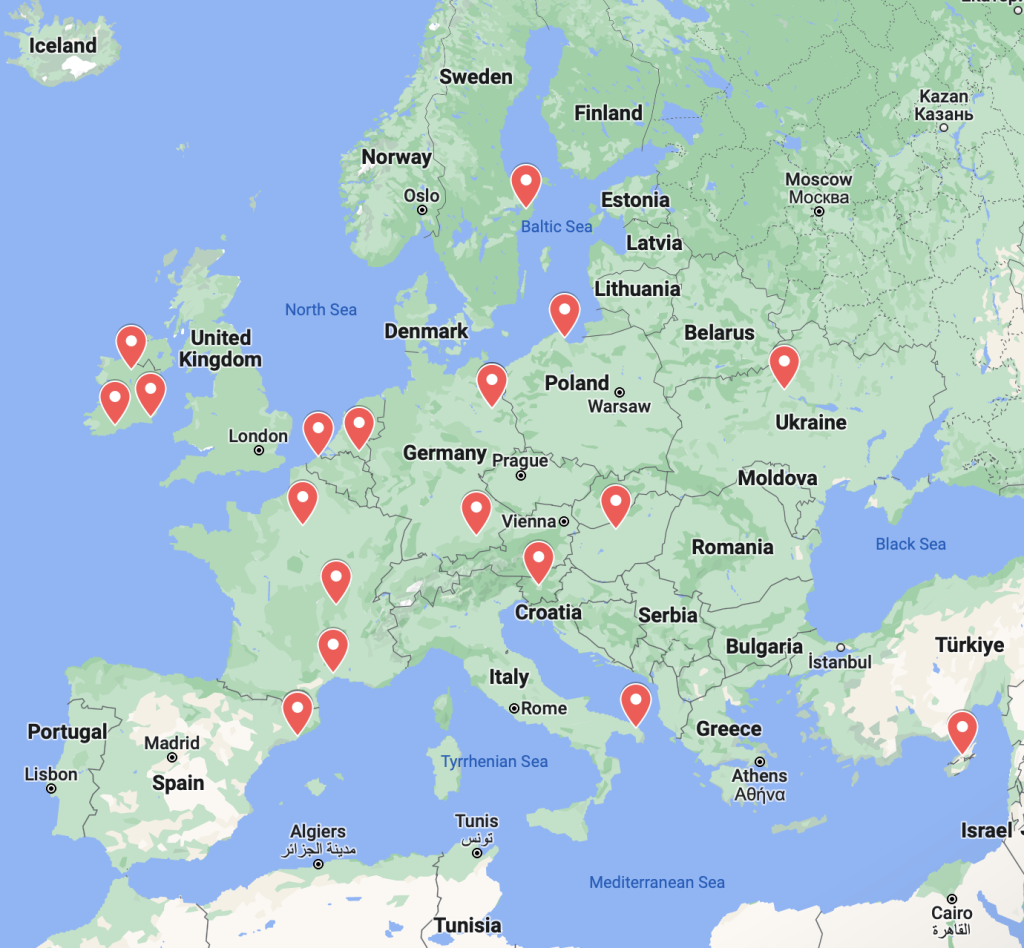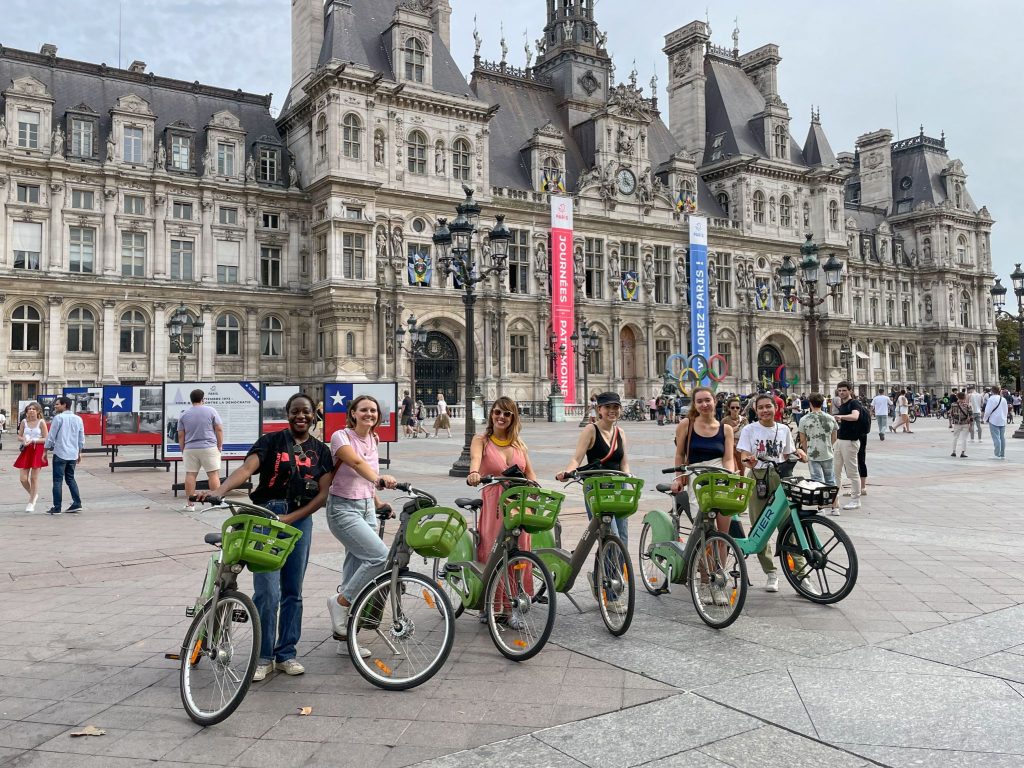Despite the well-documented health, environmental, and mental benefits of cycling, many would-be cyclists are still hesitant.
Confusion about rules of the road and nervousness about riding alongside traffic are often cited as reasons why people don’t cycle.
This is particularly so for women. Statistics from cities around the world show a major gender gap in cycling.
Looking for a way to create sustainable behaviour change through citizen engagement, Julienne Chen, EIT Urban Mobility’s Head of City Partnerships, approached Alex Baum, Programs and Systems Manager at BYCS. Inspired by the idea of a tandem bike, the duo decided to reach this eager but hesitant group through mentorship, and in 2022 launched TandEM Women in Cycling capitalising the T in training and EM standing for empowering.
This train-the-trainer programme for women is designed to turn confident cyclists into confident cycling trainers. The group then recruits and teaches other women in their community to take to the streets by bike.
“There are a lot of people who want to be part of the sustainable mobility revolution, but they feel they don’t have the tools or framework to contribute,” says Chen.
“I also kept hearing from women that they wanted to cycle but were too afraid or didn’t know how. After hearing that so many times, I realised there was a deeper structural issue at play.”
Creating ambassadors of change
Organised in yearly cohorts, EIT Urban Mobility puts out a call for applicants for confident cyclists across Europe who want to share their passion. Selected participants then complete a comprehensive 25-hour training programme that covers how to set up and run a cycling course.
Baum explains why it was important that the course was women-led: “There are real gender differences in the lived experience of cycling. That understanding is crucial to mentor women on their cycling journey. We realised the best trainers were other women who could relate and understand from personal experience.”
Once the training is complete the new cycling trainers go on to organise and lead training sessions in their own communities, tailoring their lessons to different groups with specific needs.
Some courses focus on mothers riding with children in tow, others on refugees getting to know their new city.
The 2023 cohort spans 11 cities.

Running my own course in Paris
I remember the struggle of my first few rides through the bustling streets of Paris. As an urbanist, I had observed Paris’ cycling infrastructure becoming a priority and watched cyclists with envy but grappled with the fear of riding next to whizzing cars. It was my friends who offered to ride alongside me that gave me the confidence to start riding alone. At this point, I had become a confident cyclist with a deep desire to spread the gospel of cycling. Despite this ambition, I didn’t have the skills, materials or feeling of authority necessary to organise and lead a cycling course. When I saw the call for applicants, I knew the train-the-trainer programme was the solution.
My strategy was to focus on a group I knew well – the international community. Integrating into a new country comes with a unique set of challenges. Language barriers and lack of information mean that foreigners arriving in France face extra challenges to make the modal jump.
When I started promoting my courses, I was not expecting the response it quickly received. Within less than 24 hours, I had had more demand for the lessons than I could meet. The women responding all had unique reasons for wanting to join.
One participant, Sarah Micho, tells Zag: “Living in a city like Paris, the default modes of transport are bus, metro or car. Over the past couple of years, the city has put in a lot of major infrastructure to create bike lanes. I’ve always seen people biking, but I felt too scared to do so, as before Paris I lived in a car-centric city.”
Zahra Farook, who moved to Paris to complete a PhD, echoes similar sentiments emphasising the transformative nature of the course. “I never thought I would have the confidence to cycle through the streets of Paris. However, after taking a short course, my fear vanished, and I even got my own bike. It’s been four months now, and I’m thoroughly enjoying exploring Paris on two wheels, something I once thought was beyond my reach.”
When I started the course, I knew I wanted a social component. From experience, moving to a new city means looking for connection and new friends. After each lesson, the group stuck around and joined for a coffee at a nearby cafe.
Micho explains why this comradery was a real asset: “I saw an opportunity to join a group of like-minded women conquering their fears of biking in the city so I knew that this was the next step in wanting to rediscover Paris while overcoming an internal obstacle. I learned several things about the city I was unaware of when I was previously relying on taking the metro. I learned about bike signals, safety and crossing the streets, how to navigate in cities and be autonomous.
“I also made some lovely friendships. It felt good to know I wasn’t alone.”

An exportable model
What sets TandEM Women in Cycling apart is how replicable the programme is. Once a cohort is trained, the cycle trainers can go on to teach as many groups of new cyclists as their schedule allows.
The initiative has now got 105 women cycling across 18 cities in Europe.
As the initiative continues to expand its reach across Europe, it serves as a beacon of inspiration for cities globally, showcasing the transformative power of mentorship and community engagement in promoting cycling as a viable and empowering mode of transportation.
By empowering women to not only overcome their own fears but also guide others through the process, the programme contributes to bridging the gender gap in cycling while promoting sustainable urban mobility.
To stay up to date and participate in future editions of the TandEM Women in Cycling training, sign up here.





